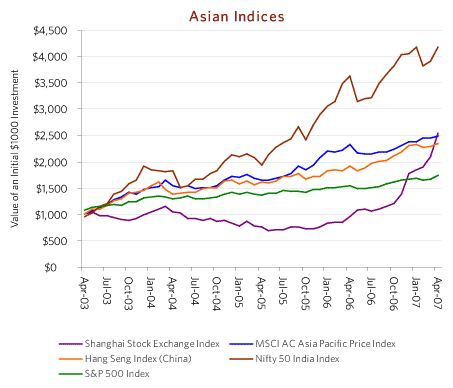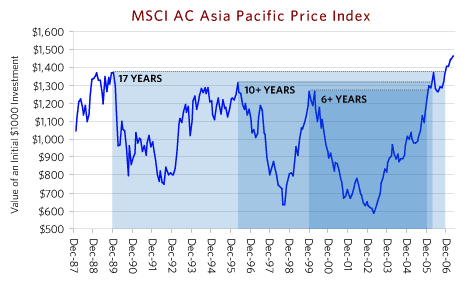Asian Stock Markets Hot or Frenzy?
Stock-Markets / Global Stock Markets Jun 05, 2007 - 01:36 PM GMTBy: John_Mauldin
 The data from the companies which analyze where investors are putting their money tells us there is a lot of money flowing into international funds and especially Asia. This week's Outside the Box we look at a short but thoughtful piece by my good friend and partner Jon Sundt of Altegris Investments. Jon is personally bullish on Asia, but he offers us a graph and some thoughts of which you should be aware before you start putting money into the high flying Asian funds.
The data from the companies which analyze where investors are putting their money tells us there is a lot of money flowing into international funds and especially Asia. This week's Outside the Box we look at a short but thoughtful piece by my good friend and partner Jon Sundt of Altegris Investments. Jon is personally bullish on Asia, but he offers us a graph and some thoughts of which you should be aware before you start putting money into the high flying Asian funds.
I will add a few comments at the end, but let's jump right into Jon's piece.
Asia: Hot Market or Frenzy?
By Jon Sundt
In the last several years, you'd be hard pressed to find a bigger story in the investment world than Asia. If you turn on CNBC or read the Wall Street Journal , the stories are constant. As I write this piece, China is again the focus of the financial world. The China markets have plunged overnight, with the Shanghai Composite Index down 6.5% and the smaller Shenzhen Composite Index down 7.2%. Of course, this pullback follows a huge run up, and I would not be surprised to see these markets reach even loftier heights in the near future.
Regardless of where the markets go in the months and years to come, the massive run up and even the significant corrections confirm the reports that right now Asia is a hot, and maybe overheated, market. The population is growing, with hundreds of millions coming out of poverty into the capitalist system...consuming, building, profiting...the Asian countries are literally swelling with wealth. According to the Economist , five million new Chinese brokerage accounts were opened in April, two-thirds more than during last year in total. 1 Volumes in Asian stock markets are increasing at an unprecedented rate, with trading volume on the Chinese markets at $16.4 billion a day in March of this year, while six months prior it was only $5 billion a day. Now, for the first time in history, the total number of shares traded on China's stock market was greater than the combined volume of all other Asia exchanges. This includes Japan, Hong Kong, Thailand, and Singapore. 2
Even standard fundamentals are reaching unheard of levels. The price earnings ratio on the Shanghai market, the country's principal bourse, is pushing 50! 3 Time magazine cites a report by JPMorgan noting that of 37 Chinese companies listed jointly in Shanghai and Hong Kong, eight trade on the mainland at valuations at least double those quoted in Hong Kong. 4 It's a frenzy.
How Can You Position Yourself to Profit in the Midst of a Frenzy?
In the last five years, finding money in Asia has been about as simple as spotting a tourist in La Jolla - very easy. Since its trough in April of 2003 to April of 2007, the MSCI Asia Pacific Price Index is up a whopping 148.15%, annualizing 24.93%. The Hang Seng Index in Hong Kong is up 135.33% over the same time period, annualizing 23.32%. The Shanghai Stock Exchange is up 154.18%, annualizing at 25.67%. India is even more impressive, up 317.91% in the Nifty 50, which comes to a 41.94% annualized return figure. Any mutual fund that had an Asia focus had tons of "beta" to bet on. Just hop on the train and ride it up.

Source: International Traders Research, Inc.
Why Do We Even Need Active Management?
As the markets have rallied, hedge funds, mutual funds, indexes, ETF's and other methods of investing in Asia have sprouted exponentially. The big questions today are this: Will the train continue to roll without more violent corrections like those we saw at the end of February and the end of May? How should you participate in Asia as an investor?
The first step to answering these big questions is thinking about the following: Should you be in an Index Fund, or with an active manager? Before you answer, have a look at the chart below. If you look at the MSCI AC ASIA Pacific Free Index from its inception in 1987 through 2006, you can see that these markets have historically been highly volatile.

Source: International Traders Research, Inc.
Returns over this time period have annualized to a mere 1.98%, with a 20.20% standard deviation. Let me put it in concrete terms: there are three periods in the last ten years when a million dollars invested, at the wrong time, would have been HALVED by a down market. That's some serious volatility.
Does this mean I am bearish on Asia? Not at all. In fact, on the contrary, long term I am very bullish. So am I saying that Index investing is the wrong choice? Again, not at all. For many, it may be a good choice.
For me, what this really means is that I am sober-minded in my approach to the Asian markets. I believe Asia is an IDEAL place for talented active management. There is tremendous complexity investing in the many exchanges that make up Asia - Geo-political risk, currency risks, the list goes on. This complexity can lead to inefficiencies and dislocations that are much different than those in a mature market like the US. And for the active manager who understands the risks, the complexity can create opportunity.
Here is the fundamental question I believe you should answer before deciding how to participate in the Asian markets: Do you think a smart team - on the ground in Hong Kong and Japan for example, given a broad mandate to hunt for "alpha" and deploy capital to sectors and countries as the markets change - has the ability to outperform a passive index over time? If the markets correct, do you think an active manager may have an advantage by having the ability to short or get out of the way?
In my opinion, active management is the best approach to the Asian markets for the right investor. The ability to lever and de-lever, actively select and deselect country, sectors and individual stocks, and to short when appropriate makes a lot of sense in these markets. Of course you will have to pay more for active management, and as a result you'll want to make sure you get what you are paying for. Just like in the US, a proper and thorough review of the manager and his team are very important.
My point is that I believe the party is just getting started. We have seen these markets before, and the Asian market isn't going away. How to participate as an investor, however, is not as clear-cut. The Asian markets are broad and complex. I believe the best way to take advantage of this momentum, for the right investor, centers on quality active management.
1 The Economist: Feeding Frenzy, May 19, 2007
2 FinancialTimes.com: Bourses in China Eclipse all of Asia, May 9, 2007, Jamin Anderlini.
3 Barrons Online: Up and Down Wall Street; Running on Vapors, May 14, 2007, Alan Abelson.
4 Time.com: China Braces for a Bubble, February 1, 2007, Kathleens Kingsbury.
I think Jon makes an excellent point. When you look at fund managers which have exposure to Asia, you really need to look at their style. Do they tend to track their corresponding and relevant indexes? If so, you might as well buy an index fund for lower fees. Investing in international funds is one area where a great deal of research on management and the underlying strategy will really pay off.
Your loving the emerging markets for the long term analyst,
By John Mauldin
http://www.investorsinsight.com
To subscribe to John Mauldin's E-Letter please click here: http://www.frontlinethoughts.com/subscribe.asp
Copyright 2007 John Mauldin. All Rights Reserved
John Mauldin is president of Millennium Wave Advisors, LLC, a registered investment advisor. All material presented herein is believed to be reliable but we cannot attest to its accuracy. Investment recommendations may change and readers are urged to check with their investment counselors before making any investment decisions. Opinions expressed in these reports may change without prior notice. John Mauldin and/or the staff at Millennium Wave Advisors, LLC may or may not have investments in any funds cited above. Mauldin can be reached at 800-829-7273.
Disclaimer PAST RESULTS ARE NOT INDICATIVE OF FUTURE RESULTS. THERE IS RISK OF LOSS AS WELL AS THE OPPORTUNITY FOR GAIN WHEN INVESTING IN MANAGED FUNDS. WHEN CONSIDERING ALTERNATIVE INVESTMENTS, INCLUDING HEDGE FUNDS, YOU SHOULD CONSIDER VARIOUS RISKS INCLUDING THE FACT THAT SOME PRODUCTS: OFTEN ENGAGE IN LEVERAGING AND OTHER SPECULATIVE INVESTMENT PRACTICES THAT MAY INCREASE THE RISK OF INVESTMENT LOSS, CAN BE ILLIQUID, ARE NOT REQUIRED TO PROVIDE PERIODIC PRICING OR VALUATION INFORMATION TO INVESTORS, MAY INVOLVE COMPLEX TAX STRUCTURES AND DELAYS IN DISTRIBUTING IMPORTANT TAX INFORMATION, ARE NOT SUBJECT TO THE SAME REGULATORY REQUIREMENTS AS MUTUAL FUNDS, OFTEN CHARGE HIGH FEES, AND IN MANY CASES THE UNDERLYING INVESTMENTS ARE NOT TRANSPARENT AND ARE KNOWN ONLY TO THE INVESTMENT MANAGER.
© 2005-2022 http://www.MarketOracle.co.uk - The Market Oracle is a FREE Daily Financial Markets Analysis & Forecasting online publication.


